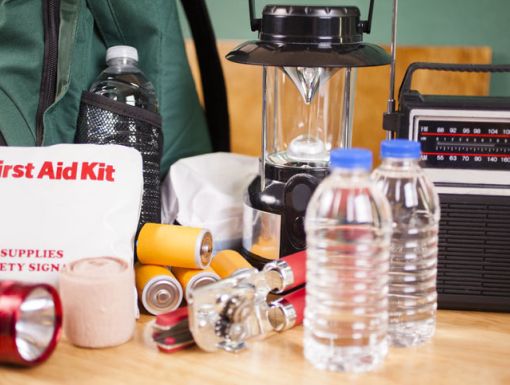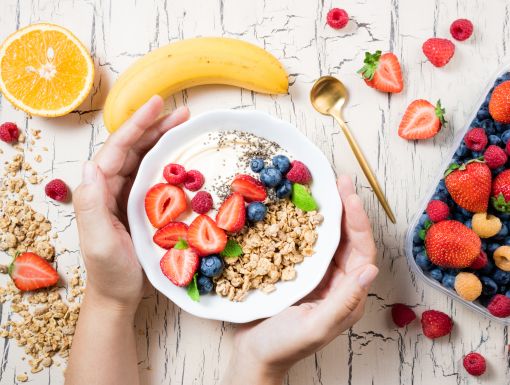
Hurricane Prep 2024: How to Stock a Healthy Pantry
When you're getting prepared for hurricane season, it can be easy to neglect your food supply in favor of flashlights and fans. In addition to the essentials, prepping your pantry with shelf-stable, nutrient-dense foods is a smart and easy way to protect your health when the power goes out. While it might be tempting to load your shopping cart with high-sodium, high-sugar and high-fat snacks (these are emergency staples for a reason, after all), these foods should not completely take the place of real balanced meals that help keep you fuller, longer.
Having a meal plan in place before the storm arrives can also help reduce anxiety. Plan on stocking enough food for everyone in your household for three days. You and your family don’t have to live on canned corn and pre-packaged ramen if you plan ahead. Here are 10 nutritious items to have on hand, no refrigeration needed:
- Dry goods: Naturally shelf-stable foods like dried beans, grains, nuts and seeds not only last forever, but offer great nutritional benefits. Combine a grain (like rice, oats or grits) with your favorite nut or legume and you’ve got a satisfying source of fiber and protein to help you take on the storm.
- Whole grains: Staples like bread, pasta, cereals and crackers can be found in whole-grain varieties for a little extra fiber.
- Produce: While often overlooked when shopping for a storm, fresh produce can be a great addition to your prep as many fresh fruits and veggies don’t require refrigeration. Look for longer-lasting options like potatoes, sweet potatoes, winter squashes, onions and garlic. Fruits like oranges, apples and avocados also do well without refrigeration and can offer a refreshing dose of vitamin C.
- Dried herbs and spices: Pack in flavor to any meal with easy-to-store dried herbs. If you opt for a spice blend, consider choosing a salt-free version to help lower your sodium intake – you may be eating more sodium-dense packaged foods during a storm.
- Canned foods: Look for ingredients, rather than products: Plain canned tomatoes in water instead of prepared spaghetti sauce, for example. Canned beans are another versatile option. Remember to look for the option with the lowest sodium content, especially if you plan to use canned products regularly.
- Windowsill herbs: Herbs like cilantro, parsley, chives, mint and basil can be kept in bunches in a glass jar with water on the windowsill for several days and add a burst of freshness to any meal.
- Condiments: Oil, vinegars, nut butters, sauces and jams offer flavor, variety and convenience. Since they are often used in small amounts, they can last a long time as well.
- Pantry milk: Milk is a staple in many households, especially those with children. Fortunately, there are many shelf-stable options that don’t require refrigeration, like powdered milk, canned evaporated milk and even pasteurized “aseptic” milk. For dairy-free folks, canned coconut milk and boxed almond and soy milk are great options. Keep in mind that shelf-stable milk must often be used in its entirety or refrigerated once open, so you may want to look for single-serve containers to prevent waste. For formula-fed infants, consider purchasing pre-mixed formula in the event water is unavailable.
- Something sweet: A healthy diet focuses on nutrients but allows room for indulgence. In addition to your favorite candy, look for some sweet products that have the added benefit of protein and fiber. Nut bars, dried fruits, protein bars and applesauce are great shelf-stable options.
- Beverages: We know water is a must – not only for drinking, but for hygiene and sanitization as well. In addition to your water (one gallon per person, per day), you may also want to stock up on your family’s favorites, like fruit juice or electrolyte drinks. If water is in short supply, making your morning coffee or evening tea might also prove tricky. Having prepared versions of your staples on hand will help you weather the storm with a greater sense of normalcy.
Nutrition is key to your wellness. That’s why it’s part of our personalized and comprehensive Concierge Health program. Learn more about membership at Ochsner.org/ConciergeHealth
Keeping a variety of pantry staples on will help you stay nourished during a power outage, even if you can't get cooking. If you plan on riding out the storm at home here are few other cooking considerations to keep in mind.
Other supplies:
- If you plan on having hot meals and don’t have a gas stove, consider investing in a camp stove or a propane grill. Make sure you stock up on propane cannisters, as well. Remember to use these grills outside in a well-ventilated area to prevent personal injury or fire.
- Make sure you have a manual can opener for any canned goods.
- If you want to save previously purchased fridge items, packing an ice chest or cooler with items you want to use up first can help save you from opening the fridge too often. Freeze jugs of water or use freezing gel packs to help keep food cold. Clean frozen water can be used as drinking water when it defrosts.
- Have leftover “hurricane food” from last year? Make sure to check the dates and toss anything that may be expired.
- Don’t forget Fido! Make sure to also have several days’ worth of food and treats for your pets.
Sanitation and preparation:
- Before an anticipated power outage, The Food and Drug Administration recommends setting your freezer to 0° F or below and your refrigerator to 40° F or below to help preserve any food in your fridge.
- Your refrigerator should keep food cold for about four hours if not opened. A half-full freezer will keep its temperature for 24 hours while a full freezer should keep its temperature for 48 hours.
- Store food high if your house is prone to flooding. Never eat food that has come in contact with flood waters.
- Metal pans, ceramic dishes and utensils can be washed with hot water and soap. Boil them in clean water for 15 minutes using one tablespoon of liquid bleach per gallon of water.
- In the event water becomes scarce, washing and sanitizing dishes or cookware will be tough. Stock some disposable plates, cups and utensils in case water sources are affected.
- If you run out of bottled water, boiling tap water for one minute will kill most disease-causing organisms. Let the water cool first, then store it in clean, covered containers.
During emergency situations, your safety is what counts. Consider these healthy options to help keep your mind and body nourished, but remember that staying fed, dry and hydrated is most important – the rest is just lagniappe.



